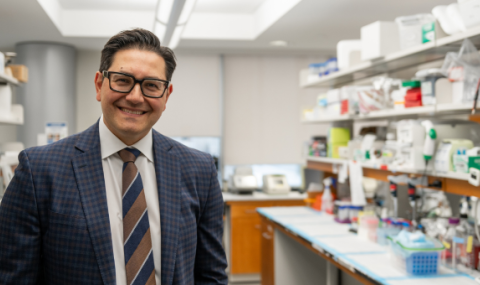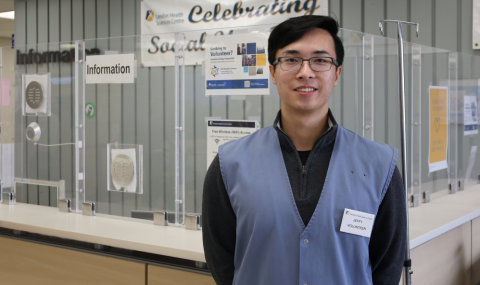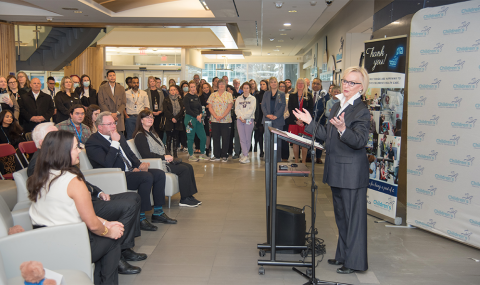MEDIA RELEASE
For Immediate Release
January 22, 2013
Fiberoptic Endoscopic Evaluation of Swallowing (FEES) allows patients to return to eating sooner
LONDON, Ontario –In hospital recovering from a left upper lobectomy to treat his lung cancer, Aaron Sinai was on a ventilator and unable to eat for almost 30 days. When Sinai’s breathing improved, Speech-Language Pathologist (S-LP) Emily Barrett used Fiberoptic Endoscopic Evaluation of Swallowing (FEES), traditionally practiced once on the onset of treatment to determine a patient’s ability to eat and drink, multiple times to monitor Sinai’s progress, and therefore alter his diet during his stay in hospital.
“After we performed the initial scope, we saw that it was safe for Aaron to take in clear fluids. We did the scope again a few days later and saw more improvements so he could move onto minced food, and then a few days after that, our scope showed that he could go back to normal meals,” says Barrett.
“This was music to my ears”, said Sinai. “I had not eaten anything for almost a month and this new intervention showed my progress in my ability to swallow confirming it was safe for me to have some food. I can’t wait to have Swiss Chalet tonight for dinner.”
FEES is a medical directive for S-LPs that allows them to visualize the throat and larynx (voice box) of a patient while swallowing food and liquid, by gently inserting a scope with a camera attached, through the nose and down the back of the throat. FEES provides immediate results, is portable and eliminates exposure of radiation in comparison to modified barium swallowing x-rays. In addition, FEES can be repeated often as a part of intervention to see how the patient’s swallowing is improving or progressing, while specific exercises are being practiced. LHSC is one of the first in Canada to use FEES for treatment and intervention therapy instead of diagnosis.
The image that is displayed on a computer screen during FEES allows the S-LP to see if swallowing is being safely completed. It also shows if changes in body position or how we use our swallowing muscles can make it easier and more efficient. For instance, Barrett taught Sinai how to use a more “effortful swallow” to clear the food from his throat. By watching himself on the screen, Sinai was better able to understand his swallowing difficulty and what he could to do to improve it.
“At the time of launch in spring 2012, I was hoping to have 50 per cent of the S-LP trained on the technology by April 1, 2013,” says Donna Bandur, manager audiology and speech-language pathology. “But the patient satisfaction and staff endorsement has been incredible resulting in 100 per cent of SP-Ls trained by February 1, 2013. This allows us to use FEES for treatment of patients instead of only assessing and contributing to the medical diagnosis. Eating sooner can also increase rate of recovery, reduce costs associated with tube feeds and reduce length of hospital stay in some patients.”
“In the Intensive Care Unit we have found that FEES provides a more efficient way to get an objective assessment of a patient’s ability to safely swallow”, said Dr. David Leasa, critical care consultant. “Critically ill patients can be assessed at bedside, rather than transfer out of the ICU for a modified barium swallow, and FEES can be easily repeated to ensure safe progression from liquids to solid foods.”
About London Health Sciences Centre
London Health Sciences Centre has been in the forefront of medicine in Canada for 138 years and offers the broadest range of specialized clinical services in Ontario. Building on the traditions of its founding hospitals to provide compassionate care in an academic teaching setting, London Health Sciences Centre is home to Children’s Hospital, University Hospital, Victoria Hospital, the Kidney Care Centre, two family medical centres, and two research institutes – Children’s Health Research Institute and Lawson Health Research Institute, a joint research initiative with St. Joseph’s Health Care London. As a leader in medical discovery and health research, London Health Sciences Centre has a history of over 65 international and national firsts and attracts top clinicians and researchers from around the world. As a regional referral centre, London Health Sciences Centre cares for the most medically complex patients including critically injured adults and children in southwestern Ontario and beyond. The hospital’s nearly 15,000 staff, physicians, students and volunteers provide care for more than one million patient visits a year. For more information visit www.lhsc.on.ca
- 30 -
For media inquiries contact:
Marek Kubow
Corporate Communications and Public Relations
London Health Sciences Centre
519-685-8500, ext. 75155
After-hours assistance:
Call LHSC Switchboard at 519-685-8500 and ask to page the communication consultant on-call
Like us on Facebook at LHSC Canada, follow us on Twitter @LHSCCanada and watch us on YouTube at LHSCCanada.


